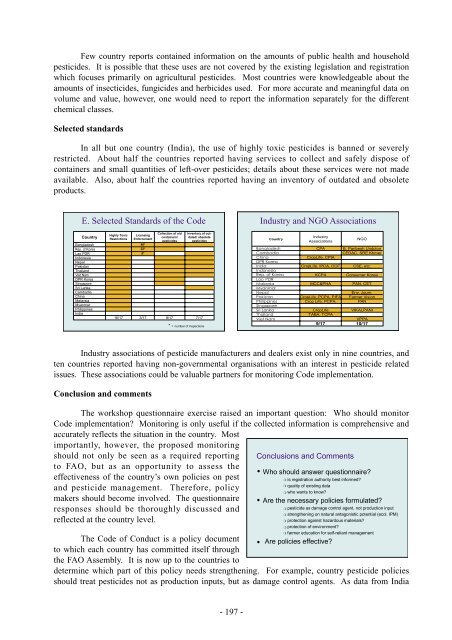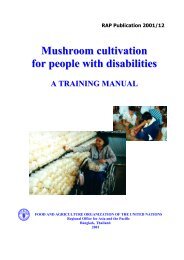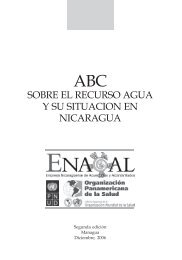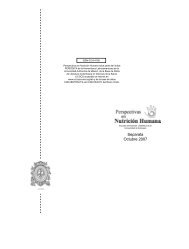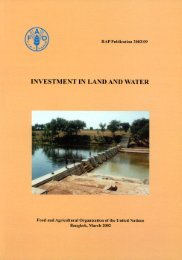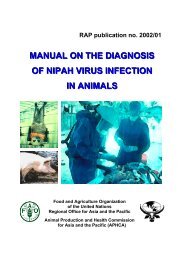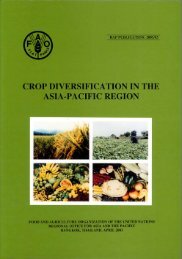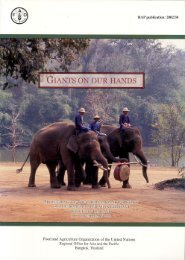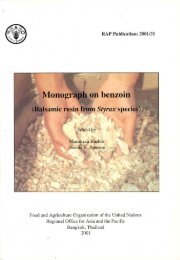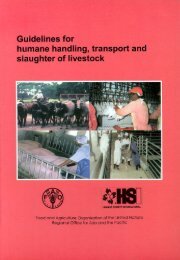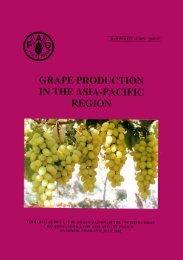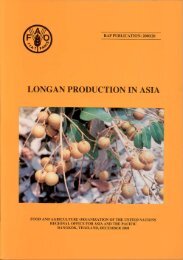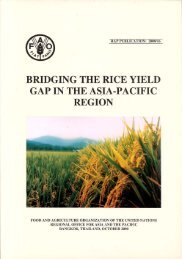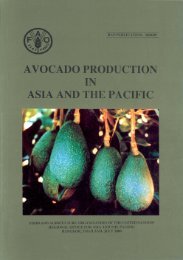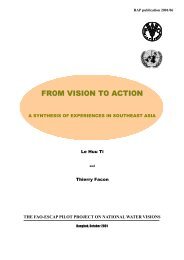Proceedings of the Asia regional workshop on the
Proceedings of the Asia regional workshop on the
Proceedings of the Asia regional workshop on the
You also want an ePaper? Increase the reach of your titles
YUMPU automatically turns print PDFs into web optimized ePapers that Google loves.
Few country reports c<strong>on</strong>tained informati<strong>on</strong> <strong>on</strong> <str<strong>on</strong>g>the</str<strong>on</strong>g> amounts <str<strong>on</strong>g>of</str<strong>on</strong>g> public health and household<br />
pesticides. It is possible that <str<strong>on</strong>g>the</str<strong>on</strong>g>se uses are not covered by <str<strong>on</strong>g>the</str<strong>on</strong>g> existing legislati<strong>on</strong> and registrati<strong>on</strong><br />
which focuses primarily <strong>on</strong> agricultural pesticides. Most countries were knowledgeable about <str<strong>on</strong>g>the</str<strong>on</strong>g><br />
amounts <str<strong>on</strong>g>of</str<strong>on</strong>g> insecticides, fungicides and herbicides used. For more accurate and meaningful data <strong>on</strong><br />
volume and value, however, <strong>on</strong>e would need to report <str<strong>on</strong>g>the</str<strong>on</strong>g> informati<strong>on</strong> separately for <str<strong>on</strong>g>the</str<strong>on</strong>g> different<br />
chemical classes.<br />
Selected standards<br />
In all but <strong>on</strong>e country (India), <str<strong>on</strong>g>the</str<strong>on</strong>g> use <str<strong>on</strong>g>of</str<strong>on</strong>g> highly toxic pesticides is banned or severely<br />
restricted. About half <str<strong>on</strong>g>the</str<strong>on</strong>g> countries reported having services to collect and safely dispose <str<strong>on</strong>g>of</str<strong>on</strong>g><br />
c<strong>on</strong>tainers and small quantities <str<strong>on</strong>g>of</str<strong>on</strong>g> left-over pesticides; details about <str<strong>on</strong>g>the</str<strong>on</strong>g>se services were not made<br />
available. Also, about half <str<strong>on</strong>g>the</str<strong>on</strong>g> countries reported having an inventory <str<strong>on</strong>g>of</str<strong>on</strong>g> outdated and obsolete<br />
products.<br />
E. Selected Standards <str<strong>on</strong>g>of</str<strong>on</strong>g> <str<strong>on</strong>g>the</str<strong>on</strong>g> Code Industry and NGO Associati<strong>on</strong>s<br />
Industry associati<strong>on</strong>s <str<strong>on</strong>g>of</str<strong>on</strong>g> pesticide manufacturers and dealers exist <strong>on</strong>ly in nine countries, and<br />
ten countries reported having n<strong>on</strong>-governmental organisati<strong>on</strong>s with an interest in pesticide related<br />
issues. These associati<strong>on</strong>s could be valuable partners for m<strong>on</strong>itoring Code implementati<strong>on</strong>.<br />
C<strong>on</strong>clusi<strong>on</strong> and comments<br />
The <str<strong>on</strong>g>workshop</str<strong>on</strong>g> questi<strong>on</strong>naire exercise raised an important questi<strong>on</strong>: Who should m<strong>on</strong>itor<br />
Code implementati<strong>on</strong>? M<strong>on</strong>itoring is <strong>on</strong>ly useful if <str<strong>on</strong>g>the</str<strong>on</strong>g> collected informati<strong>on</strong> is comprehensive and<br />
accurately reflects <str<strong>on</strong>g>the</str<strong>on</strong>g> situati<strong>on</strong> in <str<strong>on</strong>g>the</str<strong>on</strong>g> country. Most<br />
importantly, however, <str<strong>on</strong>g>the</str<strong>on</strong>g> proposed m<strong>on</strong>itoring<br />
should not <strong>on</strong>ly be seen as a required reporting<br />
to FAO, but as an opportunity to assess <str<strong>on</strong>g>the</str<strong>on</strong>g><br />
effectiveness <str<strong>on</strong>g>of</str<strong>on</strong>g> <str<strong>on</strong>g>the</str<strong>on</strong>g> country’s own policies <strong>on</strong> pest<br />
and pesticide management. Therefore, policy<br />
makers should become involved. The questi<strong>on</strong>naire<br />
resp<strong>on</strong>ses should be thoroughly discussed and<br />
reflected at <str<strong>on</strong>g>the</str<strong>on</strong>g> country level.<br />
The Code <str<strong>on</strong>g>of</str<strong>on</strong>g> C<strong>on</strong>duct is a policy document<br />
to which each country has committed itself through<br />
<str<strong>on</strong>g>the</str<strong>on</strong>g> FAO Assembly. It is now up to <str<strong>on</strong>g>the</str<strong>on</strong>g> countries to<br />
determine which part <str<strong>on</strong>g>of</str<strong>on</strong>g> this policy needs streng<str<strong>on</strong>g>the</str<strong>on</strong>g>ning. For example, country pesticide policies<br />
should treat pesticides not as producti<strong>on</strong> inputs, but as damage c<strong>on</strong>trol agents. As data from India<br />
- 197 -


